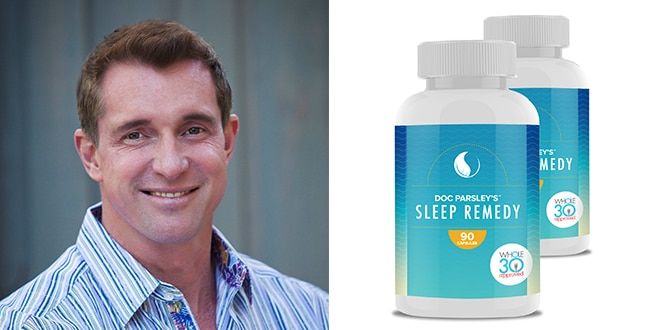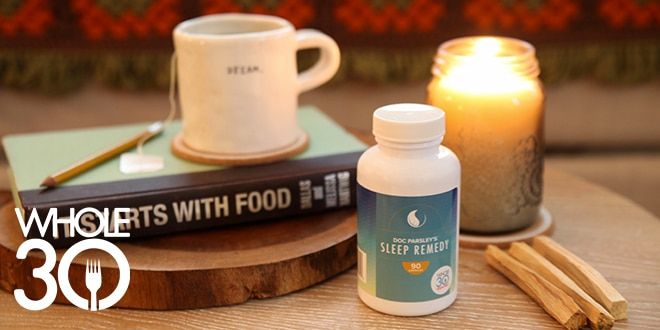A note from Whole30 Headmistress Melissa Urban, who slept 9 hours last night and doesn’t feel the least bit guilty
One of the most under-rated benefits of the Whole30 is how much better you’ll sleep during the program. People report falling asleep faster, sleeping more deeply, and waking more easily, sometimes without an alarm. Warning: You may turn into one of those annoying “morning people” by the end of your first Whole30!
But sometimes, changing your diet (even if you’re making it healthier) can make things worse before they get better. This is where healthy lifestyle choices (things you can do outside of your diet) and smart supplementation can help. For example, if your digestion is still off during your Whole30, we recommend consulting with a functional medicine doctor, or starting with a compatible digestive enzyme and probiotic (see Supplements in The Whole30).
If your sleep is disrupted during your Whole30 (typically waking in the middle of the night more frequently, or waking up earlier than usual, unable to fall back asleep), there are a number of lifestyle practices you can put into place to assist; we’ll cover those in Part 2 of our series. But smart supplementation with nutrients already present in the brain can also play a huge (and instantaneous!) role in restoring healthy, normal sleep.
I wanted to help my Whole30’ers resolve their sleep issues, so I turned to my friend, medical doctor and sleep expert Kirk Parsley. Over many nights of really good sushi, we talked about why people may experience sleep disruptions on the Whole30, how his Sleep Remedy product helped his patients sleep better, and why his current formula wasn’t compatible with our Whole30 program. (Added sweetener.) Then, the idea struck him: “Why don’t I just make a version specifically for the Whole30?”
One year of hard work later, and here we are. Read more about Dr. Parsley’s Whole30 Approved Sleep Remedy here, and how you can use it to restore or improve your sleep, whether you’re on the Whole30 or not. (And stay tuned for Part 2 of our interview!)
Introducing Whole30 Approved Sleep Remedy Capsules

Today, we’re announcing the brand new, Whole30 Approved Sleep Remedy capsules. These capsules are just as effective as Doc Parsley’s Sleep Remedy beverage, but are compatible with the Whole30 rules. Read on for more information about the Sleep Remedy capsules, or click here to purchase your own. Take 10% off your order with the code WHOLE30.
Your Whole30 + Sleep FAQs with Doc Parsley
On a scale of “not at all” to “so much I can’t even,” how much do people underestimate the importance of sleep for their health, fitness, and body composition goals?
Sleep is the most underappreciated aspect of health. It’s the time that you are repairing your body and brain… THE time that you are getting better at everything.
We evolved (as a species) to eat a certain amount, do a certain amount of activity per day, reproduce at a certain rate, communicate with other humans, etc. However, people seem to consider sleep to be a luxury among all of these human needs. But why sleep? They don’t think of eating as a luxury. How many people think they should eat only as much food absolutely necessary just to get by and stay alive? Everyone realizes that their performance would suffer if they did this, but expect that sleeping just enough to get by is gonna work out just fine.
What are a few ways that the Whole30 can help sleep?
Research has proven that people with poorly controlled blood glucose levels sleep less, and have lower quality of sleep. Improving insulin sensitivity and controlling the intake of foods that cause insulin spikes through the Whole30 will improve the balance and regulation of blood glucose levels.
Another area that often interferes with sleep is systemic inflammation. Poor food choices damage the gut lining and gut biome diversity. When this happens we are more likely to get particles from the inside of our gut (intestines) into our blood stream and lymphatic system. This leads to your body’s immune system ramping up to fight these foreign particles. Ramping up your immune system ramps up stress hormones—which interfere with sleep and blood glucose levels. It also causes an increase in the molecules that signal pain, an increase in the molecules that lead to a rise in body temperature, and an increase in molecules that govern energy consumption of the effected cells. All of these things (on a long-term basis) interfere with sleep.
If these conditions continue for weeks, months or years, you’ll essentially feel like you have a mild flu… all the time! And how well do you sleep (or perform!) when you are sick?
What are a few things people are doing that are messing with their sleep—and they don’t even know it?
The most common mistake people make is not valuing sleep enough. If you find the science motivating or just don’t believe it’s really that mission-critical to just about everything, get your Google on. Look up things like “life-span and insomnia,” “disease and insomnia,” or “disease and shift work.” Or if you are more performance-oriented, search around the area of performance that you value most, like “strength and sleep,” “weightlifting and sleep loss,” or “breathing and sleep loss.”
The next biggest problem is trying to outsmart sleep. Sleep is a normal biological function that has been optimized (through evolution) for millennia. Sleep the way that you evolved to sleep—and when—and you will get the most mileage and performance out of your body. For instance, trying to put a substance in your body to trick your brain into turning off (and giving the illusion of sleep)—such as sleep drugs—would be a poor sleep “hack.” Drugs do not make people sleep, drugs make people unconscious.
Some other common “hacks” that interfere with people’s sleep quality and quantity—and therefore interferes with everything regarding their health, wellbeing, and performance—are poly-phasic sleep, using stimulants to wake up earlier, using alcohol as a sleep aid, trying to sleep out of phase with the sun (our normal regulator of when to sleep), and so on.
The fact is, humans (like all other animals on this planet) evolved to sleep a certain amount of time, at certain times within a 24-hr period. Trying to out-smart thousands of years of evolution is very unlikely to work.
How much can naps help, and how long do they really have to be to provide benefit?
Naps are an EXTREMELY valuable performance and health tool. They can double productivity, creativity, concentration, and recovery. They can be strategically placed in one’s day to enhance any type of performance.
A nap is defined as 20-120 minutes long, and as long as it ends at least three hours before you go to sleep at night, naps do not impair nighttime sleep. A great resource for this is Dr. Sara Mednick’s book Take a Nap. In this book, Mednick teaches you how, when, and why to nap, and helps you calculate your optimal nap duration.
How does Sleep Remedy work to promote better sleep?
Sleep Remedy was primarily designed to help the Navy SEALs get off of sleep drugs (prescription and over-the-counter) by supplementing with the right dose of sleep-promoting molecules already in your brain.
Dietary factors, chronic stress, blue light exposure, failing to prepare adequately for sleep (using a collection of behaviors often called “sleep hygiene”) and many other common lifestyle-related factors lead to a deficiency of or changes in brain’s chemistry. In this scenario, the best solution is to restore healthy habits while naturally increasing specific sleep-related molecules.
The idea behind Sleep Remedy is to concentrate these nutrients quickly (in about 30 minutes) instead of their usual 3-hour period (as happens when we use the sun as our cue to start getting ready for sleep). In this state, our brains have the resources that they need to create the normal cascade of events that lead to optimal, restorative, and quality sleep.
What’s in it?
If you have ever heard of the “tryptophan coma” that occurs around Thanksgiving or Christmas, you might know that the excess tryptophan in the excessive amount of turkey consumed by me (oops! I meant to say “people”) leads to a long list of changes in our brain and nervous system, that makes us feel sleepy—an increase in tryptophan, 5-hydroxytryptophan (5-HTP), magnesium, vitamin D3, melatonin, and GABA.
No big magic here; I just put all of those things (in appropriate amounts) into the Sleep Remedy, based on my clinical work with the SEALs. The amounts and delivery of each ingredient is intended to help initiate sleep, but be gone in a few hours, letting your brain and body do the rest of the work. This prevents the grogginess associated with sleep drugs.
We pride ourselves on sourcing the best ingredients. We purposefully source non-GMO, gluten-free, pure ingredients. We also test extensively for impurities, heavy metals, toxins, bacteria, mold, and fungi before, during, and after production.
Why did you decide to create a special version just for the Whole30 community?
I consider Melissa to be a dear friend, and she and I have had many conversations as to why some people actually have difficulty sleeping when they clean up their diet. Since sleep is such a powerful mediator of appetite, willpower, energy, inflammation, gut biome, body composition, and just about every other factor related to health, happiness, and fitness, I wanted to do my part to help those ambitious people who are willing to fully lean into their Whole30 growth mindset.
Since my original product has sweeteners and natural flavoring, I told Melissa that I would figure out a way to make the product work for her community. And just one year later, here we are!
I thought Whole30 would improve my sleep quality, but I think it has gotten worse since I started my Whole30. What gives?
Stay tuned for next week’s blog post, where I share the science behind why your sleep quality might get worse before it gets better. Never fear… I’ll offer a few lifestyle solutions for you as well!
ABOUT KIRK PARSLEY, MD: Kirk Parsley served as an Underseas Medical Officer at Naval Special Warfare Group One from June 2009 to January 2013. While there, he helped develop and supervised the group’s first Sports Medicine Rehabilitation center. He is a former SEAL, and a 2004 graduate of Bethesda, Uniformed Services University of Health Sciences (USUHS)—the U.S. military’s medical school. He interned in Obstetrics and Gynecology at Balboa Naval Hospital San Diego in 2005 and then completed a Navy residence in Hyperbarics and Diving Medicine in 2006.
Doctor Parsley has been a member of the American Academy of Sleep Medicine since 2006 and served as Naval Special Warfare’s expert on Sleep Medicine. He is certified in hormonal modulation (Age-Management Medicine) and has worked as a consultant for numerous organizations and clinics. Doctor Parsley has lectured extensively on sleep, wellness, traumatic brain injury (TBI), and hormonal optimization and is currently completing an e-book on sleep optimization.
His philosophy for wellness is simple; in order to optimize our health and get the most out of our bodies and minds, we must live more closely to the way we evolved as a species. He believes that many diseases and disorders that we accept as “inevitable” in modern society are unnecessary complications of poor sleeping habits, living in a toxic environment, eating foods we were not designed to digest, and allowing stress to overwhelm us. His passion is to help his patients and clients achieve the highest quality of life possible, and realize their health, performance, and longevity goals.
Dr. Parsley spends as much of his spare time as possible with his wife Cindy, and his three beautiful children, Hayden, Cole, and Harper. He has been a competitive athlete his entire life, and enjoys nearly all outdoor activities and sports.
Header Image: Rhema Kallianpur















